Archived Newsroom • Press Release |
|
ITU releases latest global technology development figures
Korea continues to top ICT
ranking Broadband prices drop 75%
globally between 2008 and 2011 Global revenues from
telecommunication services reach USD 1.5 trillion
|
Geneva, 11 October 2012 — New figures released today by ITU
show that information and communication technology (ICT) uptake continues to
grow worldwide, spurred by a steady fall in the price of telephone and broadband
Internet services.
The new data, released in ITU’s flagship annual report
Measuring the Information Society 2012, rank the Republic of Korea as the
world’s most advanced ICT economy, followed by Sweden, Denmark, Iceland and
Finland.
Of the ten top-ranked countries, eight are from Europe. The two remaining
countries both come from the Asia-Pacific region, with the Republic of Korea in
first place, and Japan ranked 8th. The top five countries have not changed their
rank between 2010 and 2011. The only new entrant in the top ten is the UK, which
moved up from 14th place last year to 9th place in 2012.
ITU’s ICT Development Index (IDI)* ranks 155
countries according to their level of ICT access, use and skills, and compares
2010 and 2011 scores. All countries in the IDI top 30 are high-income countries,
underlining the strong link between income and ICT progress.
There are large differences between developed and developing countries, with
IDI values on average twice as high in the developed world compared with
developing countries. The report identifies the group of countries with the
lowest IDI levels – so-called ‘Least Connected Countries’ – and highlights the
need for policy makers to pay keen attention to this group.
“ITU’s Measuring the Information Society report is the most
comprehensive statistical and analytical report on the shape of ICT markets
worldwide. Our reputation as a wholly impartial and reliable source of ICT
market statistics makes this report the annual industry benchmark for technology
development,” said ITU Secretary-General Dr Hamadoun I. Touré.
Developing countries now account for lion’s share of mobile growth
The Measuring the Information Society 2012 report also identifies
countries which have made the most progress when it comes to ICT development.
These dynamic ICT markets are mostly located in the developing world – evidence
that many developing countries are catching up quickly in efforts to bridge the
so-called ‘digital divide’. Strong performers include Bahrain, Brazil, Ghana,
Kenya, Rwanda and Saudi Arabia.
In the mobile sector, developing countries now account for the lion’s share
of market growth. Mobile-cellular subscriptions registered continuous
double-digit growth in developing country markets, for a global total of six
billion mobile subscriptions by end 2011. Both China and India each account for
around one billion subscriptions.
Mobile broadband continues to be the ICT service displaying the sharpest
growth rates. Over the past year, growth in mobile-broadband services continued
at 40% globally and 78% in developing countries. There are now twice as many
mobile-broadband subscriptions as fixed-broadband subscriptions worldwide.
The price of ICT services dropped by 30% between 2008 and 2011
Globally, telecommunication and Internet services are becoming more
affordable. According to the report’s ICT Price Basket (IPB), which spans 161
economies and combines the average cost of fixed-telephone, mobile-cellular and
fixed-broadband Internet services, the price of ICT services dropped by 30%
globally between 2008 and 2011, with the biggest decrease in fixed- broadband
Internet services, where average prices have come down by 75%.
While prices in developed economies have stabilized, those in developing
countries continue to fall at double-digit rates.
That said, fixed-broadband services still remain too expensive in most
developing countries: by end 2011, the price of a basic, monthly fixed-broadband
package represented over 40% of monthly gross national income (GNI) per capita.
This compares to 1.7% in developed economies.
Affordability targets set in 2011 by the
Broadband Commission for Digital Development, on which ITU serves as co-Vice
Chair, set the targeted cost of an entry-level broadband subscription at less
than 5% of GNI.
One promising development is the growth of mobile-broadband services. In
developing countries, mobile-broadband services are more widely accessible and,
in the case of low-volume packages, less costly than fixed-broadband Internet
services. Mobile broadband is expected to boost Internet use, which stood at 32%
globally and 24% in developing countries at end 2011.
“The past year has seen continued and almost universal growth in ICT uptake.
The surge in numbers of mobile-broadband subscriptions in developing countries
has brought the Internet to a multitude of new users. But despite the downward
trend, prices remain relatively high in many low-income countries. For mobile
broadband to replicate the mobile-cellular miracle and bring more people from
developing countries online, 3G network coverage has to be extended and prices
have to go down even further,” said Brahima Sanou, Director of ITU’s
Telecommunication Development Bureau, which produces the annual report.
ICTs have growing impact on economy – developing countries are key growth
markets
The report also shows that the ICT sector has become a major contributor to
economic growth. In 2010, global exports of ICT goods accounted for 12% of world
merchandise trade, and as much as 20% in developing countries.
ITU data show that global revenues from telecommunication services reached
USD 1.5 trillion in 2010, corresponding to 2.4 % of the world’s gross domestic
product (GDP). In the same year, investment (measured by capital expenditure) in
telecommunications amounted to more than USD 241 billion, or an estimated 2% of
the world’s total gross fixed capital formation.
The figures highlight the important role developing countries are playing in
terms of telecommunication revenues and investments, particularly during the
recent economic crisis. Between 2007 and 2010, both telecom revenues and
investment continued to grow by 22% in developing countries, whereas revenues
stagnated in developed countries. Developing countries are also increasingly
attractive destinations for foreign direct investment (FDI) in
telecommunications.
By beginning 2011, nine of the top 20 telecom markets globally in terms of
revenues were developing country markets – including Brazil, China, India and
Mexico – and developing countries accounted for 35% of world telecommunication
revenue.
At the same time, ITU research and data suggest that developing countries
need a relatively higher level of investment in advanced ICT services to fuel
growth, mainly because ICT infrastructure levels are still limited.
See over for selection of charts and tables highlighting key findings
Measuring the Information Society 2012: Charts
and Tables
|
Chart 1: IDI rankings 2011 |
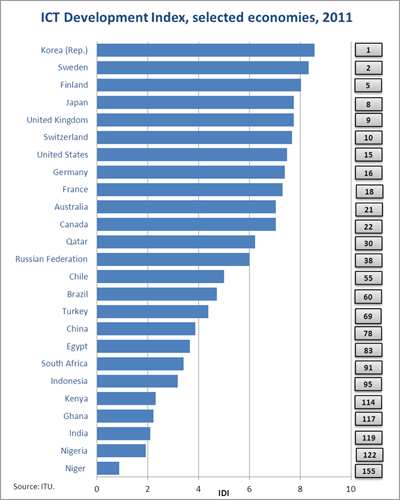 |
| Source: ITU |
| |
|
Chart 2: IDI ranges and averages, by region, 2011 |
 |
| Source: ITU |
|
Table 1: Top five IDI economies in each region and ranking in the global IDI,
2011 |
 |
| Source: ITU |
|
Chart 3: Affordability – IPB mobile-cellular (left) and fixed-broadband (right)
sub-baskets by region, 2008-2011 |
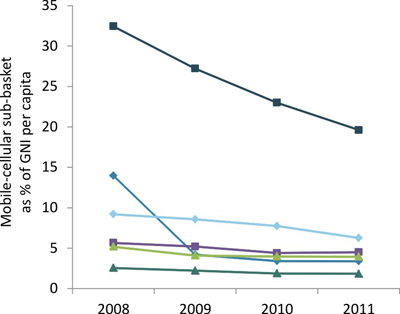 |
|
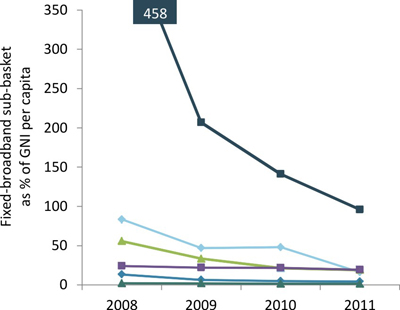 |
| Source: ITU |
Chart 4: Top 20 telecommunication markets in terms of revenue
from
telecommunication services, 2010 |
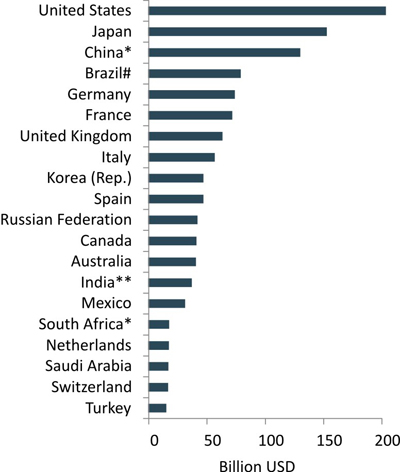 |
| Source: ITU |
| |
|
Chart 5: Total telecommunication investment, 2007-2010 |
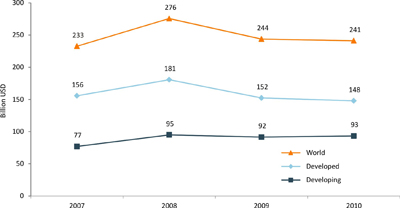 |
| Source: ITU |
*Note to editors:
The IDI combines 11 indicators into a single measure that can be used as a
benchmarking tool globally, regionally, and at national level, as well as
helping track progress in ICT development over time. It measures ICT access, use
and skills, and includes such indicators as mobile cellular subscriptions,
households with a computer, Internet users, fixed and mobile broadband Internet
subscriptions, and basic literacy rates.
For more information, please contact:
Susan Teltscher
Head, ICT Data and Statistics Division
|
Sarah Parkes
Chief, Media Relations and Public Information
|
About ITU...